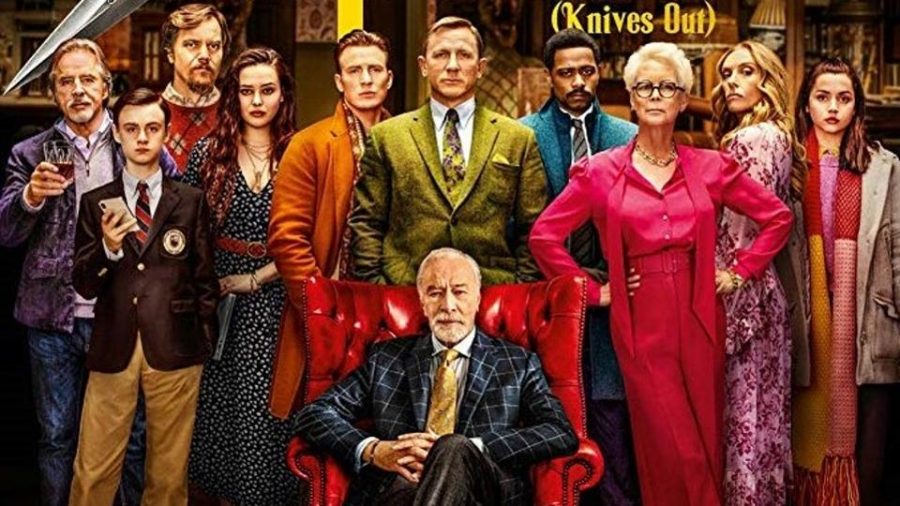Knives Out is a classic whodunnit mystery, with an A-List ensemble and plenty of style and wit. Or, at least that’s what the recent film marketed itself as…
Before reading further, please be aware that major spoilers lie ahead. As Chris Evan’s character, Ransom, says, “I’m warning you.”
If you are familiar with the marketing of Knives Out and thought that the movie looked like something you might be interested in, proceed with caution. In my opinion, Knives Out is a great movie (one of the best of 2019), but the movie is objectively, unarguably, a different film than the one that was advertised. It’s a classic bait-and-switch, and that might be an instant turn-off (or at least a disappointment) for many people.
Knives Out is not an ensemble-based whodunnit mystery. While the film starts off with a highly entertaining and fast-paced sequence in which various characters recount to the detective (played by a great, if underutilized, Lakeith Stanfield) their own versions of what exactly happened on the night that the murder of Harlan Thrombey took place. The sequence leads the viewer to believe that the movie is, indeed, exactly what was advertised. Each suspect is related to Harlan Thrombey and has a reasonable motive for killing him and an incentive to lie to the authorities.
However, approximately thirty minutes into the movie, it is revealed who actually killed Harlan Thrombey, and the murder isn’t one of the suspected relatives, and she doesn’t have anything to gain by Harlan’s death. In fact, the murderer hardly showed up in any of the trailers. The murderer is Marta Cabrera, Harlan’s Latina caretaker (played by Ana de Armas). It is at this point that the movie becomes something else. It strays away from a classic mystery and becomes something more akin to a political thriller. Yes. A political thriller. As the many Thrombey’s distinct characters blend together into an ambiguous caricature of American capitalism and/or white upper-class, Knives Out uses Marta to make strong points on immigration and cultural assimilation.
The real plot of the movie kicks into gear when Harlan gives his entire fortune and family estate to Marta in his will, and the Thrombeys, who had previously been kind (if in a superficial manner) to Marta, turn against her. The Thrombeys become the antagonists of the film, with the exception of one: Ransom, Chris Evan’s uncouth and unaffected character. Ransom rescues Marta from the violent and explosive Thrombeys and the two set off for a small adventure that consists of evading the private investigator (Daniel Craig’s Hercule Poirot-esque Benoit Blanc) and destroying any evidence that it was actually Marta who killed Harlan Thrombey. All this continues on for a bit until Blanc finally catches Marta, and it seems as if the game is up. But Knives Out director, Ryan Johnson, still has a few more cards up his sleeve. Through a wild turn of events, it turns out that Ransom was the one who had attempted to kill Harlan, which led to a mishap that led Marta to believe that she had poisoned Harlan, which led to Harlan committing suicide in an attempt to hide Marta’s supposed crime. Though it sounds complicated when compacted into a single sentence, in the context of the film, it makes (enough) sense. As the real crime was entirely committed by Ransom, Marta retains her newly acquired fortune, and kicks the rabid Thrombeys off the estate.
So that summarizes the film, though at this point it may yet be unclear if Knives Out is a good movie or a bad movie. Despite subverting expectations (mine included) with the early-on bait-and-switch, Knives Out still manages to not only entertain, but also surprise with a clever use of visuals and character. The former is showcased through the movie’s excellent costuming and even more excellent set-design. The Thrombey estate is truly something to behold (the incorporation of knives into the design proves both unsettling and clever) and it is little wonder that the Thrombeys are outraged when they acquire no part of it in the will.
Now, as for the second point: character. This is the strongest point of Knives Out. This is the buoyant force that keeps the film afloat, and it is the major reason I enjoyed the movie as much as I did. The most prominent characters in the film are Armas’s Marta, Craig’s Blanc, and Evan’s Ransom, all of which are brimming with personality and charisma. Even Benoit Blanc, whose Southern-British accent was originally off-putting, manages to pull around to being likeable and even exciting to watch by the end of the film. As for the rest of the cast (the Thrombeys), their parts are significantly smaller than the several characters previously mentioned. Yet, despite this, each manages to make an impression, and there isn’t a weak link in the bunch. Standouts include Toni Collette’s Joni Thrombey, a pretentious and condescending “influencer” of sorts, and Michael Shannon’s brash and intimidating Walt Thrombey, the youngest son of Harlan. Often fan-favorites Jamie Lee Curtis and Lakeith Stanfield do consummate jobs as well in their respective roles. Overall, every character has their own moment to shine, and while some are fleshed out more than others, they are all realized in a way that proves satisfying by the end of the film.
In summary, Knives Out is definitely a film you should check out, even if this review spoiled major parts of it. In my defense, you were warned. Nevertheless, Knives Out should prove itself to be a worthwhile watch by the end of the film, so long as you know to expect on-the-nose political commentary and a mystery that is practically solved in the first thirty minutes. In perspective the movie’s “flaws” are merely conscious and interesting choices made by Ryan Johnson, and those choices seem to be paying off, as can be seen by the film’s near perfect critical scores.
If you don’t check out this movie, you are bound to see it resurface when the big awards start getting handed out, so Knives Out and all those involved in it are definitely worth keeping an eye on.




